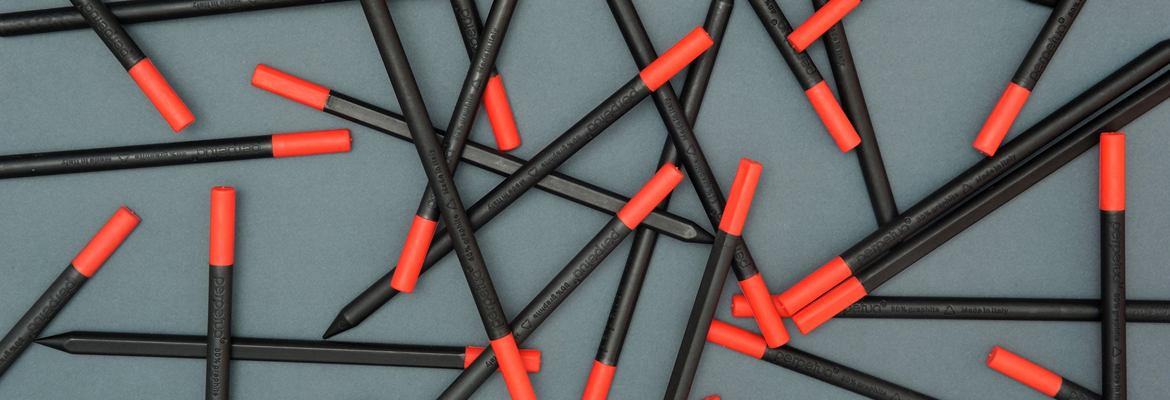If “made in Italy” production represents an added value linked to mainly local manufacturing (and often to prestigious design), the fact that a saucepan is made from recycled materials is a unique further added value – environmental in this specific instance.
ReMade in Italy – the first Italian association to have developed a technical procedure to certify traceability and content of recycled materials – revealed the “behind the manufacturing scene” of “made in Italy” products, obtained with recycled materials.
When we think of “made in Italy” products, fashion, cuisine and interior design immediately spring to mind. Nevertheless, there is a whole new sector – production from recycled materials – where Italy has a lot to say and suggest.
ReMade in Italy’s objective is raising awareness about “made in Italy”’s recycling and culture. Such no profit association was created in 2009 by Regione Lombardia, Milan Chamber of Commerce, Conai (Nation Packaging Consortium) and AMSA. To this end, ReMade aims at creating a viable framework in order to develop real tools to rate recycled products on the market.
Today, a number of consortia, associations and other actors in the recycling sector (Pannello ecologico, Ecodom and Ecopneus, to name but a few) support ReMade, and many companies manufacturing recycled products are already ordinary members. All of their products are strictly made in Italy.
The idea of creating an association for the promotion of recycled “made in Italy” started with exhibition-conferences organized by Regione Lombardia several years ago on recycling and separate collection. The presence of recycled products, often combined with very appealing design, proved very successful with the public. The activity between 2009 and 2011 attracted more and more innovation-oriented businesses, signing important agreements with other associations in this sector and several stakeholders. Recently, ReMade in Italy has also worked with the Ministry for the Environment on the analysis of the ecological footprint of some products obtained through recycling in specific production chains.
From Eco-Labelling to Accredited Certification for Recycling
To help companies communicate their commitment in recycling, ReMade in Italy uses a label (figure 1) on products and materials.

The information shown is corroborated by the association’s Scientific Committee according to scientific procedure to the highest standards.
The label not only highlights the quantity of recycled material within the end product, but the climate-changing emission savings (expressed in CO2eq) and energy use savings, linked to recycling. This information alone shows how the recycled products are eco-friendly, quite apart from the savings of virgin raw and regenerated materials inherent in the concept of recycling (figure 2).
 |
|
Producing a ton of paper with recycled materials saves 178 kg of CO2, about 84% of emissions compared to its production with virgin material. |
Somewhere along the line, within the association, members asked themselves a question: within the complex and varied panorama of voluntary eco-labelling in Italy and Europe, what are the criteria to recognize the degree of reliability of the information that eco-labelling intend to communicate? In practice, when we read “100% recycled” on any product, where does 100% come from?
This question triggered a debate within the association that led from voluntary eco-labelling to an accredited certification scheme. This seems the best way to guarantee the highest degree of reliability of information about recycling of a product, thus meeting the needs of conscious buyers – both private and public – to be informed with transparency and objectivity about what they purchase, mistrusting self-declarations that oftentimes, although not always, are on the verge of greenwashing.
“After the first stage of activities, the association made sure that a third party oversaw the information on the label. There is a need for a qualified and objective institution that comments on the environmental information of products, other than the party issuing the label, so that information can be as reliable and accurate as possible.” This is how Simona Faccioli – ReMade’s General Manager – explains the reason behind the accredited certification scheme, on the basis of the association’s technical specifications estimated by Accredia beforehand. Accredia’s assessment was carried out in order to ascertain whether the certifications issued according to the scheme, on the basis of technical specifications, meet all the requirements for accreditation.
It thus guarantees the certification system’s impartiality with no risk of a conflict of interest. The production process and supply chain audit is based on the technical regulations developed by ReMade in Italy inspecting the traceability of raw materials, the substance of recycling, the absence of potentially-toxic substances and optimal conservation of products. Only highly-trained inspectors can conduct audits in the production facilities. If the product does get certified, we can be sure that the producer pays particular attention to the raw materials employed, the inspection during the production stages, compliance with regulations and extreme care right up to the final output.
So, in Italy as well as Europe, Remade in Italy is the first accredited certification scheme entirely devoted to recycling for inspecting the traceability of materials during the production process and for checking, in percentage terms, the recycled content of a certain product.
How the “ReMade in Italy” Scheme Works
Certifying bodies, willing to become qualified product inspectors able to deliver certification, first must contact and communicate their interest to ReMade in Italy that will then grant them a temporary approval based on the satisfaction of certain technical and training requirements. From that moment, bodies have a year to carry out experimental inspections and to obtain Accredia’s final accreditation (or from a “similar” accreditation institution in another European country) to deliver certification according to the ReMade in Italy Scheme. Bodies authorized to deliver ReMade in Italy Certification can be found in the association’s website (www.remadeinitaly.it).
ReMade in Italy Certification can be granted to recycled materials and semi-finished products containing recycled materials and end products with recycled materials. ReMade in Italy catalogue already boasts over one hundred products (some examples can be found in figure 3) ranging from building materials to information technology products, such as regenerated cartridges for printers, to eco-design products and street furniture, such as benches and play areas, to fashion, apparel and stationery items. Certification is granted to those producing “made in Italy” items. To establish this, the association abides by the following regulations: the product must already have the “made in Italy” label, alternatively, its main production cycle or final manufacturing that transform its physical, dimensional, and performance characteristics or its contents must be carried out in Italy.

As far as recycling is concerned, the product must contain at least 10% of recycled material in weight. 10% in weight of each material used must come from recycling. In case of composite products, every single component must be analysed. Let us take into consideration a wooden table with metal legs. The percentage of recycled wood and metal must be checked and then the whole product is certified. This seems to be appreciated by manufacturers. Other certifications, similar from a formal point of view, analyse and certify only one component of the product. On average recycling figures exceed 50%. The low 10% entry level is justified by the fact that recycling technologies performances vary according to the type of material processed.
Certification Advantages
ReMade in Italy Certification helps businesses intending to submit a tender for green procurement, also known as Green Public Procurement (GPP). Current regulations on tenders rule that eco-labels, if conceived respecting the publicity and impartiality requirements, can demonstrate a product’s compliance with the procurement’s environmental standards. ReMade in Italy Certification is recognised by GPP; this means that if a product is certified, its compliance with environmental standards is already recognised. ReMade in Italy Certification is explicitly stated as a probative requirement in ministerial orders regulating, for each sector, the process public administrations must follow (by law) for their green procurement. As everybody knows, this market is strategically important to stimulate the use of recycled materials, thus putting into practice one of the green economy’s main guidelines.
Clear, transparent and simple eco-labels are beneficial both for businesses that have to be inspected only once, then they can use them every time they intend to submit a tender, and for public administrations because they allow them to save money and resources when checking participants’ credentials.
Seeing is Believing: ReMade in Italy’s Sustainable Product Catalogue for Expo 2015
In 2013, ReMade’s commitment focused on an important project: drawing up a catalogue of sustainable and innovative Italian products (SiExpo 2015) available to Expo Milano 2015 planners and organizers as recognition of good practices to implement sustainable policies amongst participating countries preparing their pavilions. The catalogue was approved and subsidized by Expo Spa and Camera di Commercio di Milano (Milan Chamber of Commerce). It is an important tool made available to participating countries for free, as an incentive to use eco-friendly and innovative products and it represents somehow the coronation of the important work carried out by Expo following the “Guidelines for sustainable solutions” and “Guidelines for Green Procurement” through which the Organizing Committee of this world event has promoted the application of environmentally-sustainable practices by participating countries.
 |
|
SiExpo 2015 is a catalogue of ecosustainable and innovative products available to Expo2015 planners and organizers. |
Listed products (currently more than 300 available on www.siexpo2015.it) include construction and fitting-out materials, furnishings, street furniture, packaging and fair equipment and are included because they meet ecological sustainability (content of recycled materials, absence of noxious substances, energy efficiency, etc.) and innovation requirements. ReMade in Italy and Material Connexion Italia (the biggest international research and consultancy centre specialised in sustainable and innovative materials) has collaborated to this project. A real opportunity for change.
Info
Scientific & Technical Partner:
Ministero dell’Ambiente e della Tutela del Territorio e del Mare
ReMade in Italy is a project by:
Regione Lombardia
Camera di Commercio Milano
Conai
Amsa



